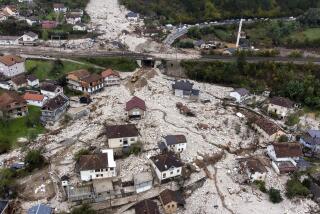EC Summons Croats, Serbs to Peace Conference : Yugoslavia: But the bloodshed continues as the warring sides trade charges of responsibility.
BELGRADE, Yugoslavia — The European Community on Tuesday summoned warring Yugoslav factions to the peace table, but the echoes ricocheting across bloody Croatia came only from gunfire.
Two days after all sides solemnly promised an immediate cease-fire to end the ethnic slaughter between Serbs and Croats in the rebel republic, there was no sign that anybody was seeking to implement one.
A peace conference is planned Saturday in The Hague under one of Europe’s most skilled diplomats. But foreign and Yugoslav observers here give it scant chance of succeeding where all past efforts have failed.
From the Croatian capital of Zagreb on Tuesday, and the Serbian capital here in Belgrade, there was no talk of peace. Rather there came another verse of, “He started it!”
Said Mario Nobilo, a Croatian foreign affairs adviser in Zagreb: “There is no cease-fire. For them (the Serbs), it is just a piece of paper. It seems that the only language they recognize is force.”
Said Gen. Marko Negovanovic, a member of the Yugoslav army high command in Belgrade: “The authorities in Croatia do not want a peaceful and democratic solution to the crisis. Rather, they want to settle it through the use of force, regardless of the consequences.”
Yugoslav federal President Stipe Mesic appealed anew Tuesday night for a cease-fire, but few seemed to be listening. There was a five-hour mortar attack against the Croatian city of Osijek on Tuesday, killing five people by Croatian count, four by count of the Yugoslav news agency Tanjug. The army said it shot back after Croatian troops shelled a training barracks.
Croatia accused Serbian irregulars, supported by the Yugoslav army, of dozens of cease-fire violations, including a new attack Tuesday near Petrinja, about 30 miles east of Zagreb, the scene of heavy fighting Monday.
By Croatian count, at least 10 people have died in Petrinja since the European-engineered cease-fire was signed early Monday by representatives of all six Yugoslav republics, including a truculent and reluctant Serbia.
Speaking for the increasingly Serbian-dominated national army, Negovanovic accused Croatia of 11 cease-fire violations in attacks against army units. He said seven people died in Petrinja on Monday, four of them soldiers, after troops responded to an attack on their barracks.
Negovanovic said Serbian irregulars had also violated the agreement but had not attacked army units, which in some areas act as a buffer between opposing forces. Croatian attacks, though, the general said, have become “much more frequent and aggressive” since the accord.
The army was being goaded into fighting by the Croats, he said, and was acting only in self-defense. He warned that the army would respond with “adequate force” to any provocation.
Croatia--and the European Community--accuses the army of supporting Serbian irregulars who have seized about one-fifth of Croatian territory since the republic declared its independence in June.
Nearly 400 people have died since then in a struggle between Croatian nationalists and Serbian forces in which the European Community has labeled hard-line Serbia as the aggressor.
Serbia insists that, if Croatia secedes, the 600,000 Serbs living there and the lands they occupy must pass into Serbian control.
Monday’s new peace accord called for the separation of forces, the disarming and disbandment of all irregular units, and the return of Croatian and Yugoslav army troops to their barracks. None of that has even begun in the 48 hours since the accord was signed.
But Europe’s prestige is on the line. Yugoslavia’s apparently insuperable ethnic hatreds--most Croats are Roman Catholics while most Serbs are Orthodox--complicate the EC’s most assertive unified venture into foreign problem-solving.
So it was that the 12-nation community of Europe’s richest countries rolled out one of its own biggest guns to support a gauzy and wounded peace effort that is further weakened with each new skirmish in Croatia.
Britain’s wily and patient Lord Carrington, a former secretary general of NATO and one of the Continent’s premier diplomats, was named to chair the peace conference.
Carrington negotiated the end of guerrilla war in Rhodesia in 1979, setting the breakaway British colony on course to become the independent black-ruled nation of Zimbabwe. Later, he was Margaret Thatcher’s foreign minister.
With Carrington presiding, EC foreign ministers will meet with Yugoslav representatives Saturday in a long-shot conference that is expected to last two days before Carrington breaks it up into working groups, according to reports from The Hague. Holland is the venue because it is president of the community this year.
“We must keep up the momentum. . . . This peace conference must convene as soon as possible,” German Foreign Minister Hans-Dietrich Genscher told reporters in The Hague on Tuesday.
Genscher stressed, however, that the cease-fire must be observed if the conference is to go on as planned, and he warned the army not to instigate violence. And neither, he made clear, will European observers--authorized by the cease-fire agreement--be deployed in Croatia until the violence ends and their safety can be assured.
Douglas Hogg, the British Foreign Office minister, said he is “cautiously optimistic” that The Hague peace conference will succeed, but he said that ultimately it is up to Yugoslavs themselves to reach agreement.
Times staff writer William Tuohy in London contributed to this report.
More to Read
Sign up for Essential California
The most important California stories and recommendations in your inbox every morning.
You may occasionally receive promotional content from the Los Angeles Times.










